14. Steve Martin
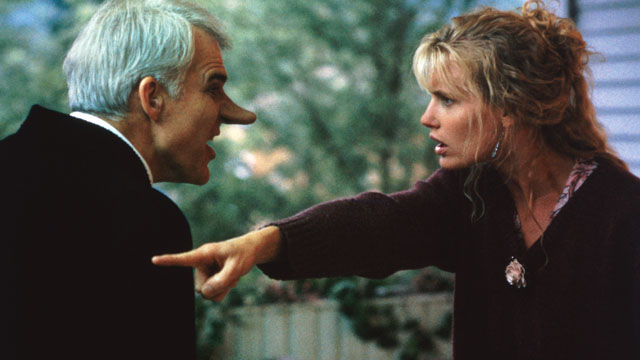
“O pointy birds, o pointy pointy, anoint my head, anointy-nointy,” says one Dr. Michael Hfuhruhurr (Steve Martin), reading from his favorite (and fictitious) book of poems by an invented writer known as “John Lillison, England’s greatest one-armed poet” in Carl Reiner’s 1983 sci-fi comedy The Man with Two Brains (co-written and starring Martin, of course).
Starting out in the 1960s as a gag writer for The Smothers Brothers Comedy Hour and then as a regular guest on The Tonight Show, by the time Martin was making funny and frequent guest appearances on Saturday Night Live in the 1970s, Martin has firmly established himself as a brilliant comic, regarded highly for his absurdist, offbeat, often banjo-accompanied comedy routines, platinum-selling comedy albums, and numerous film appearances.
Thought of mostly as a stand-up genius and TV comedian, his film appearances were little more than cameos until his leading role in Carl Reiner’s The Jerk (which he also co-wrote) which grossed, when adjusted for inflation, over a staggering $100 million. More successful films would follow, including such comedic gems as Three Amigos (1986), Roxanne (1987), Planes, Trains & Automobiles (1987), L.A. Story (1991), Bowfinger (1999), and Shopgirl (2005), amongst them.
Martin’s long and prolific career, which is still going strong, has moved away from comedy performances to also include dramatic work, continued banjo playing (he’s even won a Grammy), success as an author, a pianist, and a playwright. Consistently ranked as one of the greatest stand-up comics and comic actors around, his place on this list is warranted for so many reasons, but to his critics, he’s offered this rejoinder: “Before you criticize a man, walk a mile in his shoes. That way, when you do criticize him, you’re a mile away and have his shoes.”
13. Jacques Tati
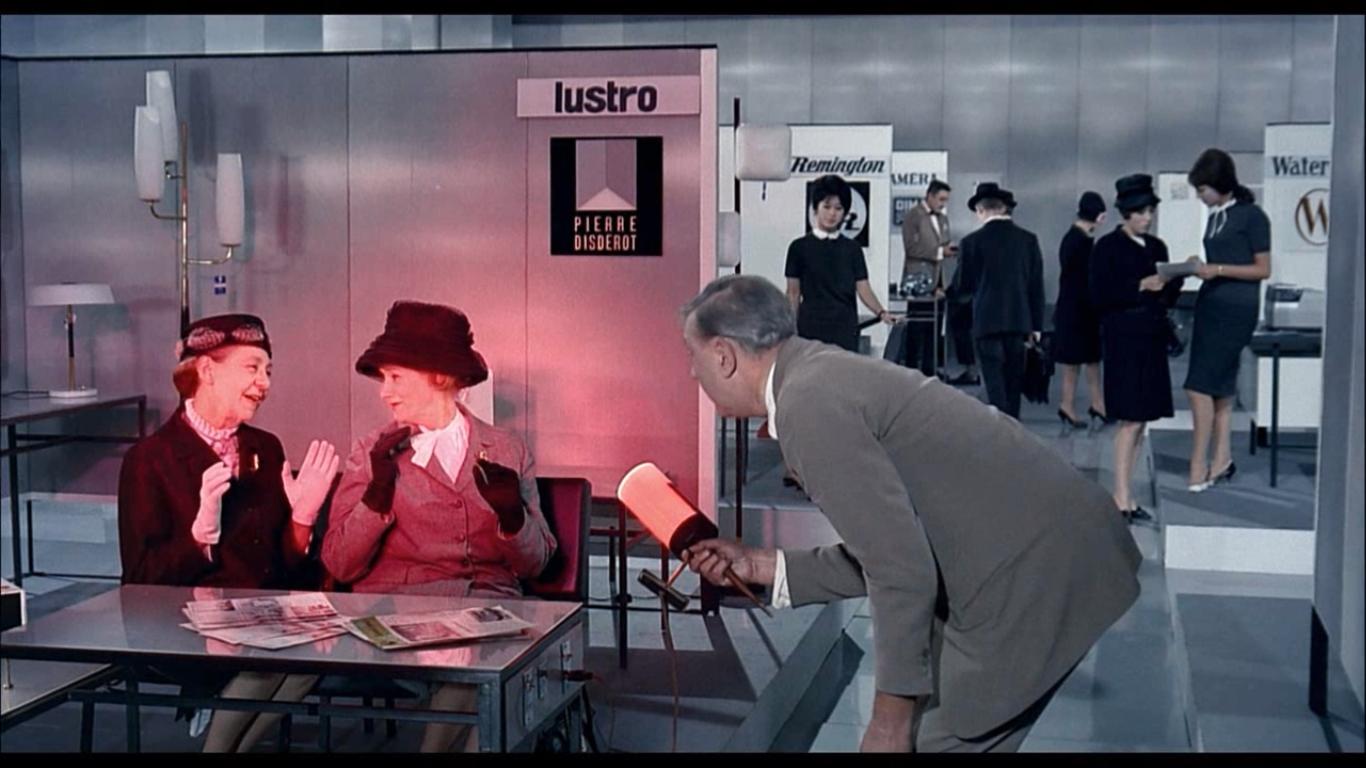
Best known for his pipe-puffing, oblivious, yet well-meaning Monsieur Hulot, French filmmaker, actor, and mime Jacques Tati specialized in painstakingly mounted and brilliantly sustained humor. While Tati (October 9, 1907 – November 5, 1982) was never as prolific as many of his peers and other iconic funnymen, the six feature-length films he did direct and star in were more than enough to classify him as a master, full stop. To quote Tati’s biographer and distinguished man of letters David Bellos; “Tati, from The School for Postmen (1947) to Playtime (1967), is the epitome of what an auteur is supposed to be: the controlling mind behind a vision of the world on film.”
Tati’s most noted works include Monsieur Hulot’s Holiday (1953), My Uncle (1958), Playtime (1967), and Traffic (1971), and since his passing has been the subject of a handful of documentaries, as well in 2010 the noted French animator Sylvain Chomet adapted Tati’s unproduced 1958 script into the award-winning animated film The Illusionist (which features a very Monsieur Hulot-like magician).
In recent years digitally restored versions of all Tati’s short and long films, as well as Criterion editions of several of his works, museum exhibitions, and repertory cinemas the world over have helped keep the Tati legacy alive, insuring Monsieur Hulot’s exploits will continue to enchant and enliven all who enter his orbit. Super bon!
12. Eddie Murphy
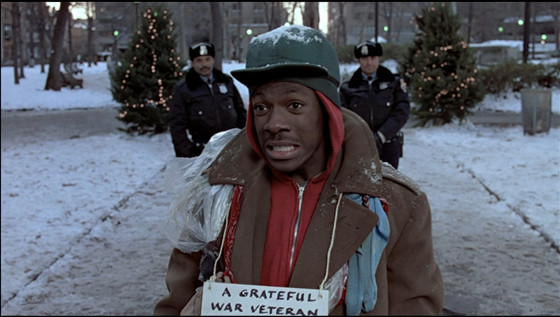
Rising to fame and box-office dominance spurred by blazing stand-up comedy routines and brilliant run as a cast regular on Saturday Night Live (“I’m Gumby, dammit!”) from 1980 to 1984, Eddie Murphy and his signature contagious laugh was an inescapable part of 1980s pop culture.
His first film was 1982’s 48 Hrs., which netted Murphy his first of many Golden Globe nominations, and was a huge hit, followed by other brazen blockbuster-level comedies such as Trading Places (1983), Beverly Hills Cop (1984)––which spawned a very successful action-comedy franchise––and Coming to America (1988). The 80s were an unstoppable decade for Murphy’s brand of relatable though often foul-mouthed humor (and though it’s cheesy AF, my fave Murphy film of that era has got to be 1986’s uneven comic fantasy The Golden Child).
The 90s saw a number of hits for Murphy with films like The Nutty Professor (1996) and its sequel, and a brilliant pairing with Steve Martin in Bowfinger (1999), though his formerly consistent track record from the 80s wasn’t maintained due to a few flops like 1995’s Vampire in Brooklyn.
The 2000s saw something of a comeback for Murphy with a 2007 nomination for the Academy Award for Best Supporting Actor for his portrayal of soul singer James “Thunder” Early in Bill Condon’s Dreamgirls as well as a lucrative and long-running role as the voice of Donkey in the DreamWorks’ Shrek films (2001 – 2010).
A father, philanthropist, and forever a prolific entertainer, Murphy continues to make films and rumors of another comedy album or tour do circulate from time to time. In 2015 Murphy was awarded the Mark Twain Prize for American Humor and probably somewhere right now a fratboy is putting a banana in someone’s tailpipe because Axel Foley did it in 1984.
11. Katharine Hepburn
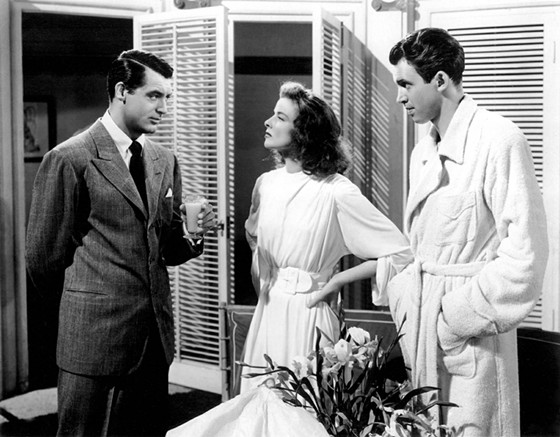
Easily one of the greatest stars of Classic Hollywood, and with an astonishing career spanning more than 60 years, Katharine Hepburn (May 12, 1907 – June 29, 2003) was a legend in every sense of the word. Known and remembered for her ribald and spirited personality as well as for her passionate independence, she wasn’t strictly just a comic actor. True, she made many marvellous screwball comedies, and her comedic chemistry with Spencer Tracy was lucrative and long-running (their onscreen-partnership spanned over 25 years and nine films), Hepburn also made a name for herself in literary dramas. Her massive and endlessly impressive body of work netted her a deserved four Academy Awards for Best Actress over the years.
A fashion icon (she made it okay for women to wear trousers), and outspoken nonconformist, her unconventional lifestyle, and her philanthropy all played in to her larger than life persona, but for the sake of this list let’s just focus on her comic gifts. One of her most memorable films is 1940’s The Philadelphia Story, where Hepburn more than holds her own against Cary Grant and James Stewart in this famed and fervid comedy of remarriage and redemption.
Rarely were films of this era so overful with sexy sophistication and stirred speech. Other charming films where Hepburn continued this idea of a modern woman of wit (and on occasion as a whip-smart middle-aged spinster) include Bringing Up Baby (1938), Woman of the Year (1942), Adam’s Rib (1949), The African Queen (1951), Pat and Mike (1952), Guess Who’s Coming to Dinner (1967), Rooster Cogburn (1975), and her late-career understated tour de force of comedy and pathos, On Golden Pond (1981).
All told, Hepburn made 44 feature films, 8 television movies, and 33 plays, winning accolades and awards in profusion and solidifying her status to mythic heights.
10. Harold Lloyd
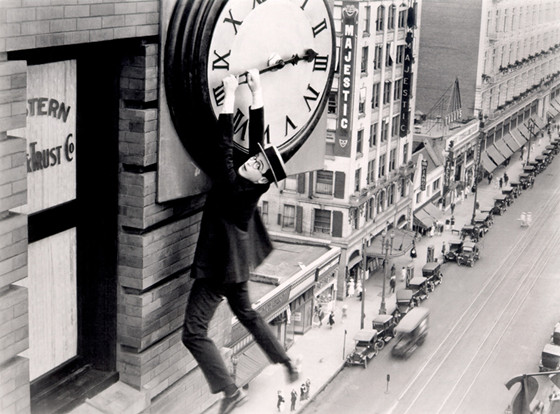
During the silent era Harold Lloyd (April 20, 1893 – March 8, 1971) was one of the reigning comic kings, and his unbelievably daring brand of stunt comedy was in a class with only Charlie Chaplin and Buster Keaton as peers.
Between 1914 and 1947, Lloyd made close to 200 comedy films, with astonishing daredevil-like action sequences that remain unrivaled even today. One of the most iconic images of Lloyd, and of the silent era in general, is of the bespectacled star hanging precariously from the unsturdy hands of a clock tower high above a bustling city street from the 1923 hit, Safety Last!
Lloyd did most of his stunts himself, routinely risking life and limb for a laugh, and occasionally at quite the cost (as in the 1919 injury where an exploding prop blew off the thumb and index finger of his right hand), popularizing his most identifiable alter ego, “Glasses.” This bespectacled character was a likeable and relatable opportunist who resonated with 1920s-era American audiences.
While Lloyd’s best remembered and appreciated works were made during the silent era, he did transition fairly well into the sound era, a claim which cannot be said for many of his peers, such as Keaton, but it’s also true that his brand of physical humor fell out of fashion for a time, and his Glasses alter ego seemed out-of-touch with the times by the late 30s and 40s. Lux Radio Theater and television talk show appearances such as Ed Sullivan, What’s My Line? and This is Your Life kept Lloyd topical throughout the 1950s and Lloyd also enjoyed renewed interest in his early works when the 1962 Cannes Film Festival celebrated his contributions to cinema.
Still highly regarded today, as this entry attests, Lloyd’s prolific career and distinct comic styles are regularly name checked and if his name is new to you, you’re in luck as much of his work has been preserved and are awaiting your discovery. Yay!
9. Madeline Kahn
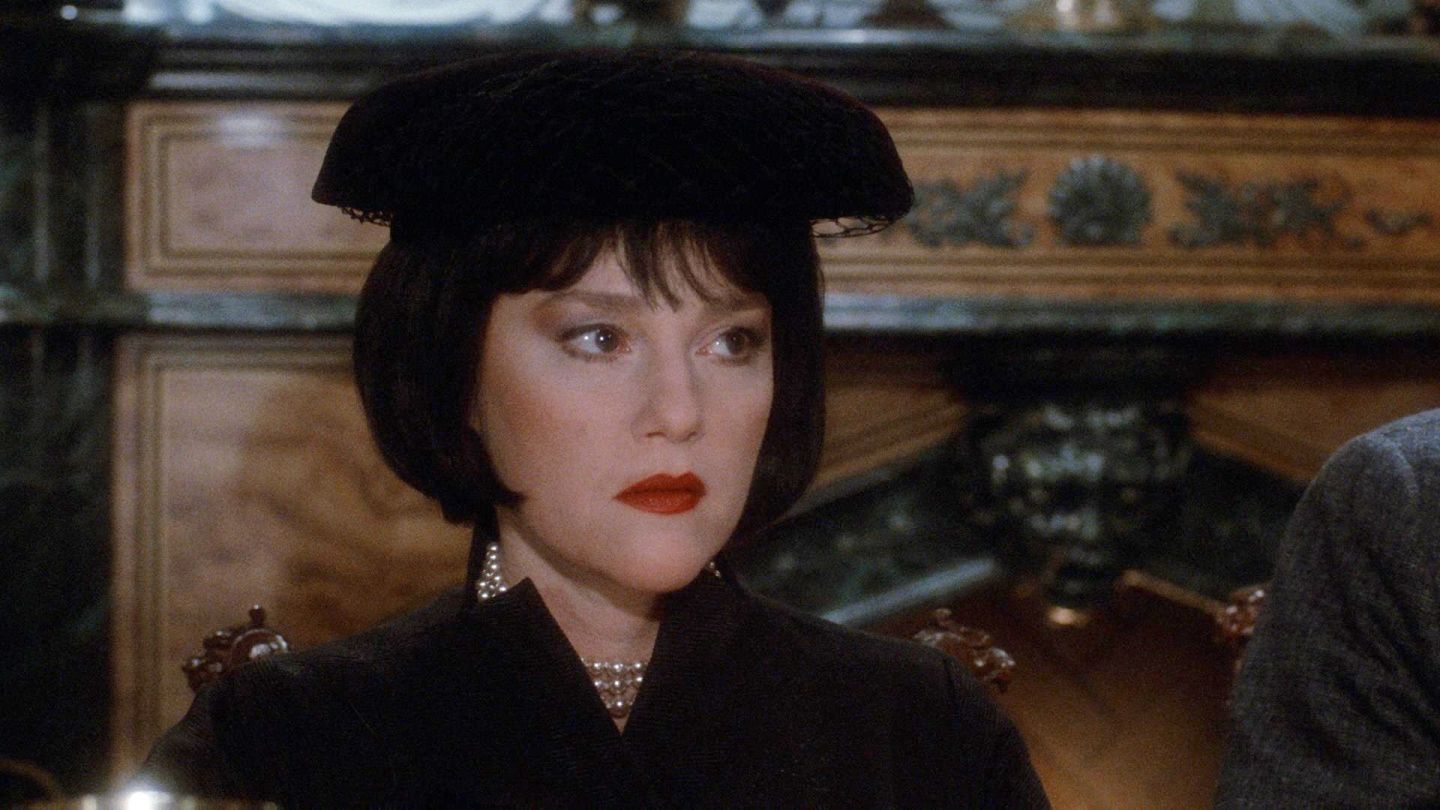
Much more than inspired actress and gifted comedienne, Madeline Kahn was also a talented singer and voice actress who made some unforgettable collaborations with writer-directors like Peter Bogdanovich (What’s Up Doc? [1972], Paper Moon [1973], At Long Last Love [1975]) and Mel Brooks (Blazing Saddles [1974], Young Frankenstein [1974], High Anxiety [1977], History of the World, Part I [1981]).
Other funny films where Kahn regularly stole scenes and netted the best laughs include Yellowbeard (1983), Clue (1985), and Betsy’s Wedding (1990), and she also made waves on Broadway (where she was nominated for a couple of Tony Awards over the years and won one in 1993), and on TV (she won an Emmy Award in 1987 for an ABC Afterschool Special).
Mel Brooks loved working with Kahn, her droll comedic touch was madcap genius, somehow hemmed in but so close to flying off the proverbial rails, and he frequently wrote parts specifically for her as she was a treasured collaborator and favorite stock player. “When I was writing [for Kahn] I always knew how crazy I could go, and that she was always gonna nail it.”
Eric Mendelsohn, who directed Kahn in Judy Berlin (1999), her final film before she succumbed to cancer that same year, said, “full of neurotic energy yet warm and loving [Madeline Kahn] really was one of those people who when you stood around her, she gave off this unbelievable glow.” Thanks for all the wonderful laughs, Maddy.
8. Cary Grant
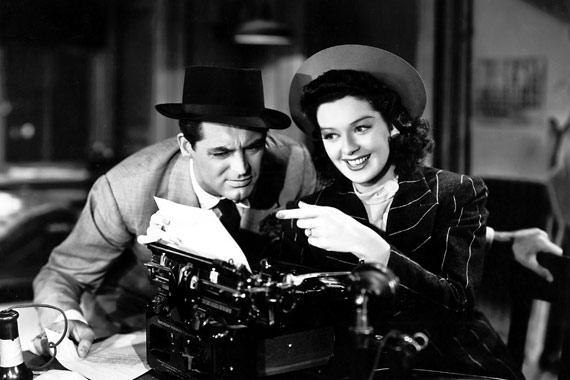
For a time considered to be the Hollywood’s definitive leading man during the classic era, Cary Grant (real name Archie Leach; January 18, 1904 – November 29, 1986) was a recognizable movie star full stop. Renown for his seemingly effortless light-touch performances, his unerring sense of comic timing, as well as his transatlantic accent (everyone and their dog used to imitate Grant with cries of “Judy, Judy Judy!”), his nonchalant poise, and shocking good looks that made him something of a sardonic ladies’ man, Grant’s was a career of broad range and dynamism.
While Grant’s early films in the 1930s were mostly crime films and melodramas, he made a string of rom coms and screwball comedies that became enormously popular and to this day are cited amongst the all-time greatest comedy movies. These titles include; The Awful Truth (1937), Bringing Up Baby (1938), His Girl Friday (1940) The Philadelphia Story (1940), Arsenic and Old Lace (1944) and I Was a Male War Bride (1949).
No mention of Grant’s celebrated career would be complete without mentioning his formidable working relationship with Alfred Hitchcock (classics like Suspicion [1941], Notorious [1946], To Catch a Thief [1955] and North by Northwest [1959] are very emblematic of Grant’s gifts but it’s really only in the latter two that any traces of his comedic genius resurfaces), and ol’ Hitch famously espoused that Grant was the only actor that he loved to work with.
Grant’s charming mass appeal and self-effacing disposition certainly counts for much of what made him so illustrious, but also his dazzling light delivery and impeccable comic timing also must be factored in.
In an article about great comic actors, the now defunct magazine Premiere descried: “[Cary Grant] is quite simply, the funniest actor cinema has ever produced,” and fans and trivia buffs might be delighted to learn that John Cleese named his character in A Fish Called Wanda (1988), “Archie Leach” as an homage to his inspirational hero.